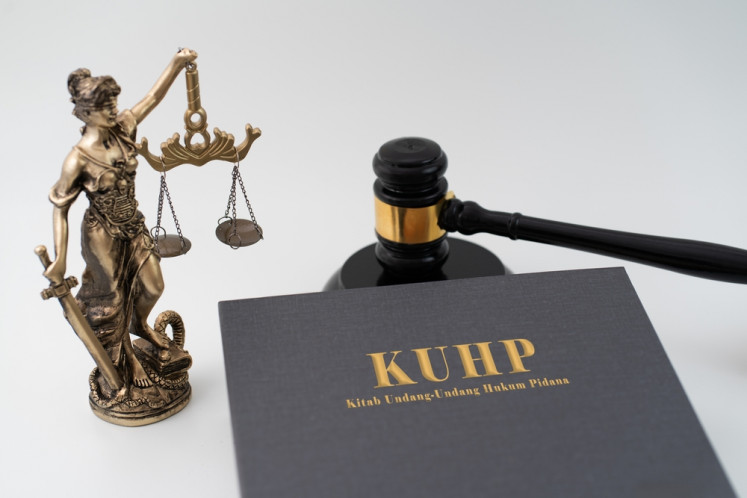Popular Reads
Top Results
Can't find what you're looking for?
View all search resultsPopular Reads
Top Results
Can't find what you're looking for?
View all search resultsGovt prepares road map for IoT industry
Fostering collaboration: Indotelko founder Ismanto Darwin (right) shakes hands with Communications and Information Ministry director general for post and informatics management Ahmad M
Change text size
Gift Premium Articles
to Anyone
F
span class="caption">Fostering collaboration: Indotelko founder Ismanto Darwin (right) shakes hands with Communications and Information Ministry director general for post and informatics management Ahmad M. Ramli (second left), accompanied by the ministry’s director general for post and informatics resources and devices, Ismail (left), after a discussion at the ministry’s headquarters in Jakarta on Tuesday. During the event, the ministry discussed Internet of Things (IoT) and its proposed market-oriented regulations on the matter. (JP/Bangkit Jaya Putra)
The government is drafting a road map on the Internet of Things (IoT) industry to help create a conducive business climate and spur growth in the digital economy.
The road map would set frequency, standardization and local content (TKDN) requirements for devices, Communications and Information Ministry director general for post and informatics resources and devices Ismail, said Tuesday.
The first two aspects will be managed by the ministry, while the last aspect will be tackled by the Industry Ministry.
“[Our job] is to prepare a playing field for industry players so they are comfortable enough to innovate. This is to provide certainty so that if they invest in a business, they face no legal problems [in the future],” Ismail said in a roundtable discussion with business players at the ministry.
He further said the road map would be launched next year, asserting that although it might not satisfy all parties, it would drive the transformation of Indonesia into an advanced country in terms of technological advancement.
There is no rule that arranges the frequency used by IoT devices and consequently, some of them deploy unlicensed frequency, interrupting telecommunication signals.
IoT refers to technology that enables devices to connect to the internet, enabling them to operate some functions automatically. In the real world, for example, a smart fridge can notify users when they have run out of eggs.
The IoT market in Indonesia is projected to reach Rp 444 trillion (US$32.86 billion) by 2022.
According to a McKinsey report released last year, the number of internet-connected devices will reach 50 billion in 2020, leaping from only 18.2 billion in 2015. Indonesia can utilize digitization to realize total productivity impact of $120 billion by 2025.
The report also estimates the digital economy will contribute around $150 billion to the economy by 2025.
In line with what the report suggests, industry players have urged the government to develop regulations that support the growth of IoT ecosystems locally and pave the way to boost the country’s productivity in the long run.
Andyan Pradipto, the head of wireless marketing and solution at global network solution provider ZTE Indonesia, suggested that the government prepare a cooperation scheme that involved ministries, regional governments, industry and IoT players.
He added that while necessary, the local content requirement could be implemented gradually in line with the maturity level of the domestic industry.
“[The policy regarding] TKDN is important because it can open up opportunities for new industries. However, as a recommendation, it could be applied later,” he said. He added it was important to grow the IoT market first to enable global players to help Indonesia catch up with IoT development in other countries.
Meanwhile, Joddy Hernady from SVP media and digital business at major operator PT Telekomunikasi Indonesia (Telkom), highlighted safety issues.
As the IoT industry expands, many devices will be connected and able to transmit information and therefore, it is crucial to set rules on data protection, privacy and security.
“Regulations on data protection are very important. Data needs to be protected so it is not used by unauthorized parties,” he said.










